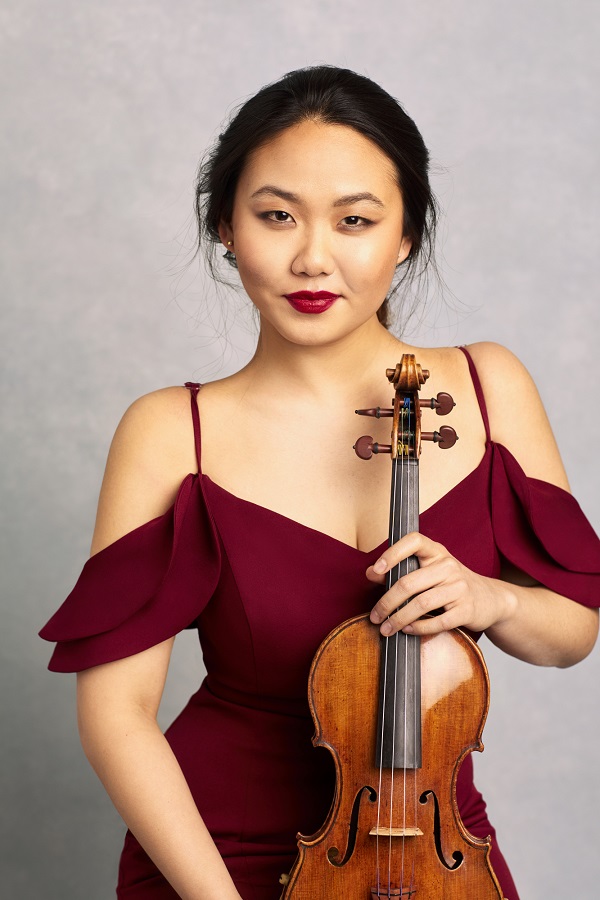CMS Lincoln Center presents mixed all-string program at Wolf Trap

Violinist Stella Chen played with Chamber Music Society of Lincoln Center at Wolf Trap Friday night. Photo: Fay Fox
Chamber Music Society of Lincoln Center put its string players in the spotlight for their latest concert in the Barns at Wolf Trap. Increasing in size from trio to quintet to sextet, Friday night’s program also deepened from treble to bass with the change in instrumentation. Unfortunately, contributions from individual musicians were not always even.
Violinist Stella Chen was the star of the opening work, Beethoven’s String Trio No. 3, her bravura tone a brilliant match for all of the composer’s considerable demands. Intonation disagreements cropped up in the first movement from her partners, violist Paul Neubauer and cellist David Requiro, but improved as the work settled into place. Neubauer went on to display a rich and refined sound on the exposed viola countermelody in the second movement.
Requiro labored a bit in the Scherzo, one result of a tempo choice that felt a notch too harried. Particularly at the low end of his instrument, Requiro’s tone did not always hit the center of the pitch, with a growling style of attack that obscured the texture of the piece. In the trio section of the Scherzo, on the other hand, Neubauer shone on the viola’s nonstop runs. All three musicians dashed breathlessly through the finale, with Chen’s supreme technique setting a sterling standard.
A sense of poise and equilibrium pervaded the middle piece, Mozart’s String Quintet No. 2, grounded on the more elegant tone of cellist Mihai Marica. Hsin-Yun Huang brought a more reserved sound to the first viola part, which added subtlety to this complex piece. Paired with Neubauer on second viola, Huang became a driving force on the undulating accompaniment lines in the first movement.
Ani Kavafian, who began playing with CMS in 1979, exuded calm on the second violin part, a veteran presence as the longest-tenured member of the ensemble. In the longing second movement, however, her reticent solo contributions weakened in the upper range. Chen’s brio on the first violin more than compensated, especially in the third movement, a Menuetto in canone. Her bold line was echoed by Marica’s cello in canon one measure later.
Neubauer took advantage of the silence of the second viola part to listen to the even more complicated trio, a double mirror canon. In a soft tapestry of sound, Chen answered Kavafian in an inverted form of the lead melody, spaced two measures apart, after which Marica echoed Huang in a second inverted imitation, also after two measures. Mozart further entwines the double canon in the B section of the trio, in which the parts overlap differently but maintain their imitations, ending in a clever chromatic twist.
The group moderated the tempo of the concluding theme and variations just enough so that everything lined up optimally. Chen floated tranquilly on her triplet-infused solo line in the second variation, while Kavafian and Neubauer tangoed in octaves on their syncopated melody in the third variation, accompanied by perfectly tuned staccato chords. With sunny turns through both the relative and parallel major keys, the work came to a happy close.
All six musicians came together for the final work, the String Sextet No. 1 of Johannes Brahms, with Kavafian and Chen switching violin parts. The senior violinist’s restraint at the helm gave this golden-hued piece a sense of wistful introspection, with pacing that heeded the composer’s careful indications not to go too fast in most of the movements.
Neubauer and Huang also swapped viola parts, which put the former in opposition to Kavafian as their lead lines dueled in the development section of the first movement. This also highlighted Neubauer’s more soloistic tone in the opening of the second movement and at the head of the lower instruments, so often emphasized by Brahms.
At climaxes, though, one missed Chen’s virtuosity and volume on the first violin part, as Kavafian wavered in accuracy at the top, especially in the third and fourth movements. The Scherzo bounced forcefully otherwise, and the finale was gracious and gentle in spirit. Requiro took the first cello part in the Brahms, a good call since his ardent upper register thus featured most prominently, taking the lead role among the lower instruments in the fourth movement.
Pianists Zhu Wang and Wu Han join the Orion String Quartet 3 p.m. May 8, for a program of jazz-influenced music by Ravel, Milhaud, Gershwin, and Wynton Marsalis. wolftrap.org


